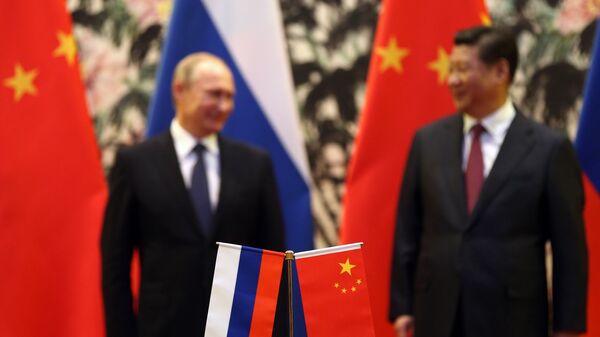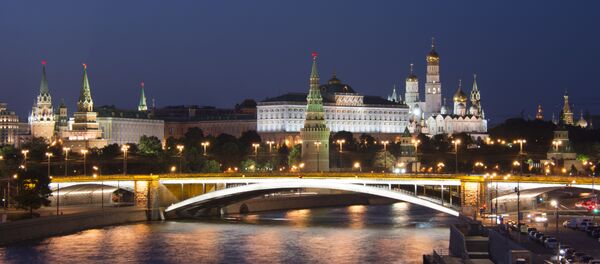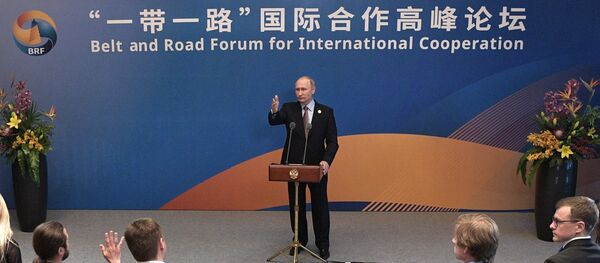For more than a decade American and European observers have been speculating about China's threat to Russia; however, none of the gloomy predictions have come true, Sputnik contributor Viktor Marakhovsky remarked in his recent op-ed.
Back in 2001, Strategic Forecasting (Stratfor), an American geopolitical intelligence firm dubbed "the shadow CIA," raised the alarm over the alleged threat of "China's creeping expansion" in Russia's Far East.
"The Chinese population in Russia's Far East continues to increase, mostly through illegal immigration. Though this creeping expansion could represent a serious geopolitical threat to Russia in the long run, some ramifications could be felt much sooner," the report claimed.
Six years later Andrei Piontkovsky, a visiting fellow at the Hudson Institute in Washington, DC, threw into doubt the possibility of a Russo-Chinese strategic alliance in his op-ed for The Guardian.
"Russia and China have been holding joint military maneuvers in the presence of both Russian President Vladimir Putin and Chinese President Hu Jintao. But a new strategic alliance between the two countries is not likely, as it is China that poses the greatest strategic threat to Russia," Piontkovsky wrote on August 27, 2007.
"China will never be interested in Russia's economic and political modernization, for it prefers Russia to remain a source of mineral and energy resources and a vast 'strategic rear' in its looming challenge with the United States," Piontkovsky wrote.
While none of the aforementioned threats has ever taken shape, antagonists of the Sino-Russian rapprochement are busy inventing new geopolitical anxieties.
"Russia is ready for economic absorption by China," Marakhovsky noted ironically, citing those opposed to Moscow's participation in the Beijing-led One Belt One Road project.
The latest version of the "Chinese threat" envisages neither "creeping expansion" nor grabbing Russia's natural resources, but "a 'malicious' investment in the development of a transit infrastructure through the Russian territory," the journalist specified.
"At first, what they imputed to China was Western nationalist imperialism, then a hypertrophied Western totalitarianism, then Western demographic phobias, and now — Western neocolonialism," Marakhovsky wrote.
"The basic logic allowing [them] to release new versions of the 'Russian Threat' one after another, is, incidentally, the same as in the case with China. [They say:] 'Look how big and strong Russia is. It's impossible that it does not harbor a plan to occupy us. It does not matter if it makes a good offer: If we make a deal, it will destroy our freedom,'" the journalist elaborated.
What lies at the root of the attempts to drive a wedge between Moscow and Beijing?
Perhaps, US geostrategist and former National Security Adviser Zbigniew Brzezinski nailed it in his speech at the Nobel Peace Prize Forum in Oslo, Norway, in December 2016.
"The US must be wary of the great danger that China and Russia could form a strategic alliance, generated in part by their own internal, political, and ideological momentum, and in part by the poorly thought out policies of the United States. Nothing is more dangerous to the US than such a close connection," Brzezinski stressed.
As Chinese President Xi Jinping noted during his meeting with his Russian counterpart Vladimir Putin in mid-May, boosting China-Russia relations is a strategic choice made by both Moscow and Beijing. Xi stressed that the countries should make every effort to enhance and maintain the relations no matter how the international situation changes.
Speaking to Sputnik on the eve of the international One Belt One Road forum on May 14-15, Sergey Sanakoyev, head of a Russian-Chinese analytical center, highlighted an "unprecedented level" of relations between Beijing and Moscow.
"It is hardly possible to give an example of another two countries that would have such a strategic partnership with Russia and China… Relations between the two countries can be called a mature strategic partnership. Taking into account the existing tension in the world, this partnership is starting to look like an alliance," Sanakoyev emphasized.




